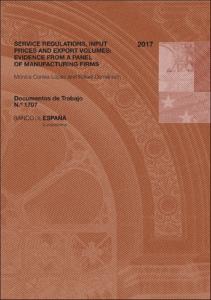Registro completo de metadatos
| Campo DC | Valor |
|---|---|
| dc.contributor.author | Correa López, Mónica |
| dc.contributor.author | Doménech Vilariño, Rafael |
| dc.coverage.spatial | España |
| dc.date.accessioned | 2019-08-10T18:13:41Z |
| dc.date.available | 2019-08-10T18:13:41Z |
| dc.date.issued | 2017-03-02 |
| dc.identifier.issn | ISSN: 1579-8666 (en línea) |
| dc.identifier.uri | https://repositorio.bde.es/handle/123456789/7256 |
| dc.description.abstract | Utilizando datos de panel, este trabajo muestra que una mejor regulación en el sector servicios reduce el precio de los consumos intermedios que soportan las empresas de manufacturas, especialmente aquellas de mayor tamaño. El beneficio de un marco regulatorio que fomenta la competencia en el sector servicios se extiende a los mercados internacionales. Entre 1991 y 2007, las reformas en servicios habrían permitido a las grandes compañías industriales españolas incrementar sus exportaciones reales de bienes alrededor de un 22 % en términos acumulados, a lo largo de este período, frente a un hipotético escenario sin reformas. Más aun, si se hubiera producido la convergencia en materia regulatoria al marco de mejores prácticas en 2007, el volumen de exportación de las grandes empresas hubiera sido un 10 % superior, en términos acumulados, frente al valor observado. No obstante, no se observa evidencia robusta de este efecto en el caso de las pymes. El estudio muestra que el tamaño de la empresa es relevante para estudiar el vínculo que existe entre las reformas regulatorias, los precios de los consumos intermedios y el volumen de exportación |
| dc.description.abstract | Using a panel of firm-level data from Spanish manufacturers, this study shows that better service regulation reduces the price of intermediate inputs paid by downstream firms. The beneficial cost effects of services reforms extend to both large and small-to-medium sized corporations (SMEs), but the former tend to enjoy greater gains. This feature also manifests itself in international markets. We identify an input cost channel through which service regulations affect the volume of exports of large manufacturers, while the evidence of such channel is weaker for SMEs. Our estimates indicate that, from 1991 till 2007, large firms increased their volume of exports by an average of 22% as a result of the direct input cost effect of services reforms, such that the firms that benefited the most typically belonged to industries more dependent on service inputs. Furthermore, convergence to the “best practice” regulatory framework in services would have raised exports at least by an additional 10%. We conclude that firm size is relevant for the connection between services reforms, intermediate input prices and export volumes |
| dc.format.extent | 36 p. : gráf. |
| dc.language.iso | eng |
| dc.publisher | Banco de España |
| dc.relation.ispartof | Documentos de Trabajo / Banco de España, 1707 |
| dc.rights | Reconocimiento-NoComercial-CompartirIgual 4.0 Internacional (CC BY-NC-SA 4.0) |
| dc.rights | In Copyright - Non Commercial Use Permitted |
| dc.rights.uri | https://creativecommons.org/licenses/by-nc-sa/4.0/deed.es_ES |
| dc.rights.uri | http://rightsstatements.org/vocab/InC-NC/1.0/ |
| dc.subject | Regulación en servicios |
| dc.subject | Precios de los consumos intermedios |
| dc.subject | Exportaciones |
| dc.subject | Tamaño de empresa |
| dc.subject | Service regulations |
| dc.subject | Intermediate input prices |
| dc.subject | Exports |
| dc.subject | Firm size |
| dc.title | Service regulations, input prices and export volumes : evidence from a panel of manufacturing firms |
| dc.type | Documento de trabajo |
| dc.identifier.bdebib | 000358546 |
| dc.identifier.bdepub | DTRA-201707-eng |
| dc.subject.bde | Tamaño de la empresa |
| dc.subject.bde | Política estatal hacia el mercado y política industrial |
| dc.subject.bde | Comercio internacional |
| dc.publisher.bde | Madrid : Banco de España, 2017 |
| dc.subject.jel | L11 |
| dc.subject.jel | L43 |
| dc.subject.jel | F14 |












